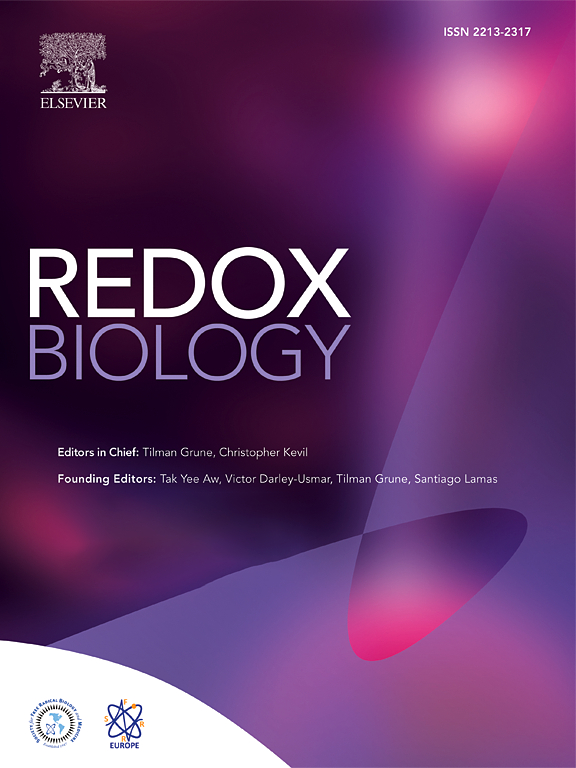泛素特异性蛋白酶38通过ACAD11的翻译后修饰加重糖尿病心肌病
IF 10.7
1区 生物学
Q1 BIOCHEMISTRY & MOLECULAR BIOLOGY
引用次数: 0
摘要
背景:糖尿病性心肌病(DCM)是糖尿病的一种普遍而严重的并发症,有效的治疗策略仍然有限。泛素特异性蛋白酶38 (USP38)与多种心血管疾病有关。在本研究中,我们探讨USP38在DCM发病机制中的作用。方法制备心肌细胞特异性转基因敲除USP38小鼠,注射链脲佐菌素建立糖尿病小鼠模型。利用暴露于高糖条件下的新生大鼠心肌细胞进行体外实验。通过超声心动图、电生理分析、组织学评估和分子分析评估心脏重构。结果ds38在DCM中的表达明显上调。心肌细胞特异性USP38过表达加重糖尿病小鼠心功能障碍、心脏炎症和心肌纤维化、线粒体功能障碍和室性心律失常易感性增加。相反,心肌细胞特异性USP38缺失可改善心脏结构和电重构,并减轻线粒体损伤。在体外也观察到类似的结果。机制上,rna测序分析、免疫沉淀和质谱分析以及脂质组学分析表明,USP38直接与ACAD11相互作用,使其去泛素化和失活。这导致异常脂肪酸氧化和随后的激活受体晚期糖基化终产物(RAGE)途径在糖尿病心脏。使用FPS-ZM1抑制RAGE抑制心肌细胞特异性USP38过表达糖尿病小鼠的心脏重塑和功能障碍。结论USP38通过ACAD11的翻译后修饰加重糖尿病诱导的心脏重构和DCM,为DCM的治疗提供了新的靶点。本文章由计算机程序翻译,如有差异,请以英文原文为准。
Ubiquitin-specific protease 38 exacerbates diabetic cardiomyopathy via post-translational modification of ACAD11
Background
Diabetic cardiomyopathy (DCM) is a prevalent and severe complication of diabetes, for which effective management strategies remain limited. Ubiquitin-specific protease 38 (USP38) has been associated with various cardiovascular diseases. In this study, we investigate the role of USP38 in the pathogenesis of DCM.
Methods
Cardiomyocyte-specific transgenic and knockout USP38 mice were generated, and diabetic mouse model was established using streptozotocin injections. Neonatal rat cardiomyocytes exposed to high glucose conditions were utilized for in vitro experiments. Cardiac remodeling was assessed through echocardiography, electrophysiological analysis, histological assessment, and molecular analysis.
Results
USP38 expression was significantly upregulated in DCM. Cardiomyocyte-specific USP38 overexpression aggravated cardiac dysfunction, cardiac inflammation and myocardial fibrosis, mitochondrial dysfunction, and increased vulnerability to ventricular arrhythmia in diabetic mice. Conversely, cardiomyocyte-specific USP38 deletion improved cardiac structural and electrical remodeling and attenuated mitochondrial impairment. Similar results were observed in vitro. Mechanistically, RNA-sequencing analysis, immunoprecipitation and mass spectrometry analysis and lipidomic analysis demonstrated that USP38 directly interacts with Acy-CoA dehydrogenase (ACAD11), deubiquitinating and inactivating it. This leads to abnormal fatty acid oxidation and subsequent activation of the receptor for advanced glycation end products (RAGE) pathway in diabetic heart. Pharmacological inhibition of RAGE using FPS-ZM1 hampered cardiac remodeling and dysfunction in cardiomyocyte-specific USP38 overexpressing diabetic mice.
Conclusion
The study demonstrates that USP38 exacerbates diabetes-induced cardiac remodeling and DCM via post-translational modification of ACAD11, highlighting a novel therapeutic target for DCM.
求助全文
通过发布文献求助,成功后即可免费获取论文全文。
去求助
来源期刊

Redox Biology
BIOCHEMISTRY & MOLECULAR BIOLOGY-
CiteScore
19.90
自引率
3.50%
发文量
318
审稿时长
25 days
期刊介绍:
Redox Biology is the official journal of the Society for Redox Biology and Medicine and the Society for Free Radical Research-Europe. It is also affiliated with the International Society for Free Radical Research (SFRRI). This journal serves as a platform for publishing pioneering research, innovative methods, and comprehensive review articles in the field of redox biology, encompassing both health and disease.
Redox Biology welcomes various forms of contributions, including research articles (short or full communications), methods, mini-reviews, and commentaries. Through its diverse range of published content, Redox Biology aims to foster advancements and insights in the understanding of redox biology and its implications.
 求助内容:
求助内容: 应助结果提醒方式:
应助结果提醒方式:


